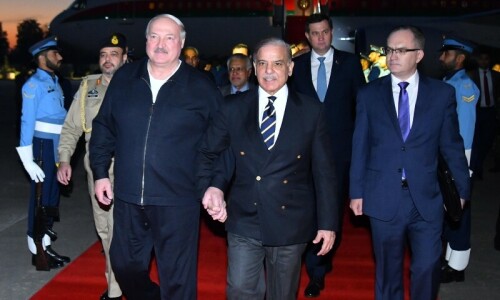WASHINGTON: Even with the world spotlight on Iraq and on the brutal civil war in Liberia, somehow the Middle East conflict has crept back on the American political stage, as it has a habit of doing.
Israeli Prime Minister Ariel Sharon and Palestinian Prime Minister Mahmoud Abbas are both due at the White House in the next seven days, bringing US President George W. Bush back into the center of Middle East negotiations.
Bush is only reluctantly following the path followed by his predecessor, Bill Clinton. Clinton presided over the spectacular failure to make peace at Camp David three years ago between Palestinian Chairman Yasser Arafat and Israeli Prime Minister Ehud Barak. Bush has avoided such intimate involvement in the Middle East as a result of Clinton’s failure.
In a way, the episode illustrates the “law of unintended consequences”.
Back in 1998, 18 former top Washington officials wrote a letter to then-President Clinton saying “removing Saddam Hussein and his regime from power” would lead to a general shake-up in the Middle East, including progress toward peace in the Israeli-Palestinian dispute. Clinton ignored the letter, since many of the signatories were so- called neo-conservatives, “neo-cons” in the current vernacular, were not his favourite people.
Ten of the signatories wound up as important figures in the Bush administration, including Secretary of Defence Donald Rumsfeld and his deputy, Paul Wolfowitz. They pressed that same policy toward Iraq once in office. They were right in one respect: The war in Iraq has shaken up the Middle East.
Some results were favourable. In Saudi Arabia, which had been suspected by the US government of being lax toward terrorists, the government on Monday said it had arrested 16 terrorism suspects in Jeddah and confiscated a huge underground arsenal of bomb-making chemicals, detonators and rocket-propelled grenades and rifles.
Other results were less favourable. The Israeli parliament, according to a study by Samar Assad for the Palestine Centre in Washington, drafted legislation introduced by Sharon’s Likud party that would define the occupied West Bank and Gaza as “not occupied”. The Palestine Centre said, “Although non-binding, the legislation raises doubts over Israel’s credibility.”
In effect, if Sharon and his government do not accept that the West Bank is occupied by Israel, there is nothing to talk about with the Palestinians, and the American “roadmap” for peace in the Middle East leads to nowhere.
At the same time, Abbas, also known as Abu Mazen, told reporters in the Middle East that it was “out of the question” for him to crack down on Hamas and other such organizations defined by the United States and Israel as terrorists, because it would “lead to civil war”.
Meanwhile, the US Congress also thrust itself into the process. The pro-Israel lobbying group, the American Israel Public Affairs Committee, noted earlier this week that the appropriations committees of both the Senate and the House approved about 2.64 billion dollars in foreign aid for Israel, while at the same time calling for stricter audits on the much smaller amount of money going to the Palestinians.
Some of that aid to Israel will be going, according to the Palestine Centre, for Israel’s 650-kilometre “security wall, a towering fence which the Palestinians say will enclose and isolate Palestinian communities and create a de facto annexation of about 55 per cent of the West Bank.
Bush, speaking at his Texas ranch rank with Italian Prime Minister and European President Silvio Berlusconi, warned both Iran and Syria that “they will be held accountable” if they fail to cooperate more with the American campaign against terrorism.
The response from Iran showed how complex the war on terrorism and the Middle East negotiations has become. The Iranian Foreign Minister Kamal Kharrazi denied Bush’s accusation of supporting terrorism and said that it is the United States which is harbouring terrorists.
He was referring to the so-called Peoples Mujhadin, an Iranian opposition group which has been allowed to operate in the United States, even though the US State Department lists the group as a terrorist organization. The group is mainly based in Iraq, where it had cooperated with Saddam Hussein’s military forces.
Thus the war on terrorism has come full circle, with the United States being accused of supporting terrorism by a country that the United States considers to be a militant supporter of terrorist groups and a military ally of Saddam Hussein.—dpa












































Dear visitor, the comments section is undergoing an overhaul and will return soon.